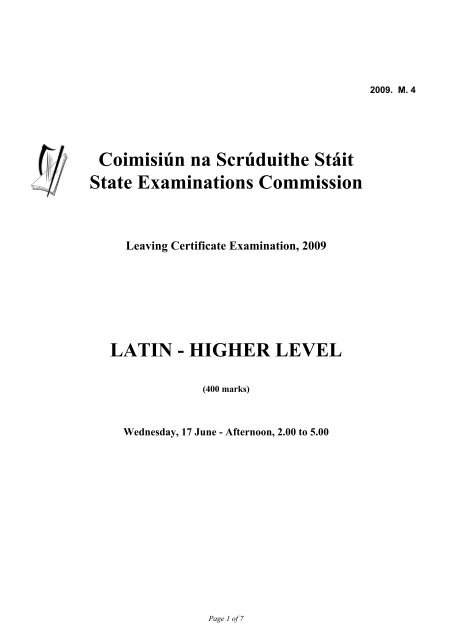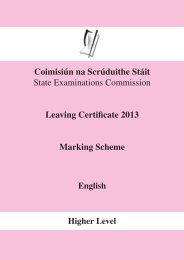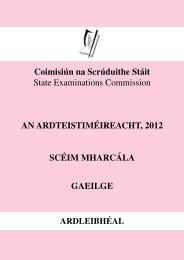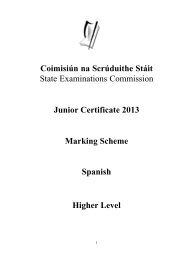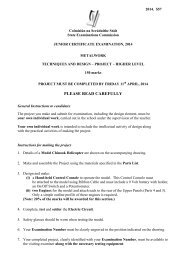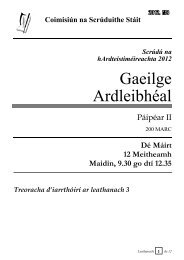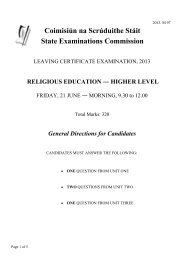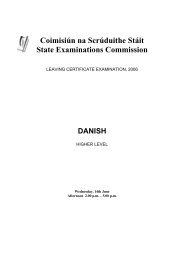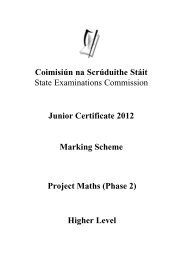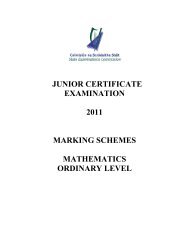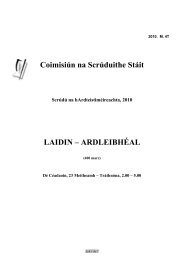Create successful ePaper yourself
Turn your PDF publications into a flip-book with our unique Google optimized e-Paper software.
Coimisiún na Scrúduithe Stáit<br />
State <strong>Examinations</strong> Commission<br />
Leaving Certificate Examination, 2009<br />
LATIN - <strong>HIGHER</strong> <strong>LEVEL</strong><br />
(400 marks)<br />
Wednesday, 17 June - Afternoon, 2.00 to 5.00<br />
Page 1 of 7<br />
2009. M. 4
1. Answer Section A or Section B in this question:- [75]<br />
A. Translate into Latin:-<br />
On the following night, therefore, Hannibal led his men out of the camp, carrying only their<br />
weapons, so that the place seemed deserted. He hoped that the enemy would attack<br />
quickly and that he would catch them while they were plundering the camp. When he had<br />
crossed the nearest mountains, he ordered his leaders to hide their men on both sides of<br />
the road. At dawn, when the Roman scouts approached the camp, they reported to the<br />
general that the enemy had left. “If we attack at once,” they announced, “we can capture<br />
the camp without difficulty.” However, the general was afraid that the enemy would return.<br />
I plunder: praedor (1).<br />
OR<br />
B. Read the following passage and answer, in English, all the questions which follow:-<br />
(King Antiochus is brought to his senses)<br />
Antiochus, receptus ab ceteris Aegyptiis partim voluntate partim metu, ad Alexandream<br />
modicis itineribus descendit. Ad Eleusinem transgresso flumen, qui locus quattuor milia<br />
passuum ab Alexandrea abest, legati Romani occurrerunt. Antiochus eos cum<br />
adven<strong>ie</strong>ntes salutasset dextramque Popilio porrigeret, tabellas ei Popilius senatus<br />
consultum scriptum habentes tradit atque omnium primum id legere iussit. Quibus<br />
perlectis cum se consideraturum, quid fac<strong>ie</strong>ndum sibi esset, dixisset, Popilius virga, quam<br />
in manu gerebat, circumscripsit regem ac “priusquam hoc circulo excedas”, inquit, “redde<br />
responsum, senatui quod referam.” Obstupefactus tam violento imperio parumper cum<br />
haesitaret, “Faciam”, inquit, “quod censet senatus.” Tum demum Popilius dextram regi<br />
tamquam socio atque amico porrexit. D<strong>ie</strong> deinde finita cum excessisset Aegypto<br />
Antiochus, legati Cyprum navigant et inde classem Antiochi, quae vicerat proelio Aegyptias<br />
naves, demittunt.<br />
porrigo: I stretch out. tabellae: letter. senatus consultum: an order of the senate.<br />
virga: a stick. haesito: I hesitate. finitus: appointed.<br />
(i) In what way was Antiochus received by the Egyptians? (6)<br />
(ii) How far was Eleusis from Alexandria? (6)<br />
(iii) How did Antiochus greet Popilius? (6)<br />
(iv) What exactly did Popilius give Antiochus? (8)<br />
(v) Translate the words quibus perlectis in lines 5 and 6. (8)<br />
(vi) What did Popilius do with the stick he was holding? (6)<br />
(vii) What instructions did he give Antiochus? (8)<br />
(viii) How did Antiochus feel about these instructions? (6)<br />
(ix) What reply did Antiochus offer? (8)<br />
(x) How does Popilius then consider Antiochus? (6)<br />
(xi) What action was taken by the ambassadors at the end of this passage? (7)<br />
Page 2 of 7
2. Translate into English one passage from Section A and one passage from Section B.:- [130]<br />
A. (i)<br />
A. (ii)<br />
B. (i)<br />
(Cicero examines the reasoning behind murder trials)<br />
Sed antequam ad eam orationem venio, quae est propria vestrae quaestionis, videntur ea esse<br />
refutanda, quae et in senatu ab inimicis saepe iactata sunt, et in contione ab improbis, et paulo<br />
ante ab accusatoribus, ut omni errore sublato, rem plane, quae veniat in iudicium, videre possitis.<br />
Negant intueri lucem esse fas ei, qui a se hominem occisum esse fateatur. In qua tandem urbe<br />
hoc homines stultissimi disputant? Nempe in ea, quae primum iudicium de capite vidit M. Horati,<br />
fortissimi viri, qui nondum libera civitate, tamen populi Romani comitiis liberatus est, cum sua<br />
manu sororem esse interfectam fateretur. An est quisquam, qui hoc ignoret, cum de homine<br />
occiso quaeratur?<br />
Cicero (65)<br />
proprius: special, particular. quaestio: trial. iacto: I discuss. plane: clearly.<br />
intueor: I look upon. fateor: I admit. nempe: surely not. comitia: assembly.<br />
OR<br />
(Spanish ambassadors claim that they will despair if they do not receive assistance)<br />
In Hispania interim consul haud procul Emporiis castra habebat. Eo legati tres ab regulo<br />
Bilistage, in quibus unus filius eius erat, venerunt querentes castella sua oppugnari nec spem<br />
ullam esse resistendi, nisi praesidium Romanus misisset; tria milia militum satis esse, nec hostes,<br />
si tanta manus venisset, mansuros. Ad ea consul, moveri quidem se vel periculo eorum vel metu,<br />
dicere; sed sibi nequaquam tantum copiarum esse, ut, cum magna vis hostium haud procul absit,<br />
dividendo exercitum minuere vires possit. Legati, ubi haec aud<strong>ie</strong>runt, flentes ad genua consulis<br />
provolvuntur orantque, ne se in rebus tam trepidis deserat: quo enim se repulsos a Romanis<br />
ituros?<br />
Livy (65)<br />
Emporiae: a town in Spain. regulus: a ch<strong>ie</strong>f. nequaquam: by no means.<br />
minuo: I make smaller.<br />
(The author begs Augustus to return to Rome because of the many<br />
blessings he brings to the Roman people)<br />
Divis orte bonis, optime Romulae<br />
custos gentis, abes iam nimium diu;<br />
maturum reditum pollicitus patrum<br />
sancto concilio, redi.<br />
lucem redde tuae, dux bone, patriae:<br />
instar veris enim vultus ubi tuus<br />
adfulsit populo, gratior it d<strong>ie</strong>s<br />
et soles melius nitent.<br />
tutus bos etenim rura perambulat,<br />
nutrit rura Ceres almaque Faustitas,<br />
pacatum volitant per mare navitae,<br />
culpari metuit fides.<br />
Page 3 of 7<br />
Horace (65)<br />
maturus: early. concilium: assembly. instar + Gen.: like. adfulgeo: I shine upon.<br />
niteo: I shine. nutrio: I nourish. almus: kindly. Faustitas: fertility. navita = nauta.
B. (ii)<br />
OR<br />
(While the Trojans are performing funeral rites for Anchises, Juno sends down Iris, goddess of<br />
the rainbow, to the Trojan women)<br />
Dum variis tumulo referunt sollemnia ludis,<br />
Irim de caelo misit Saturnia luno<br />
lliacam ad classem ventosque aspirat eunti,<br />
multa movens necdum antiquum saturata dolorem.<br />
illa viam celerans per mille coloribus arcum<br />
nulli visa cito decurrit tramite virgo.<br />
conspicit ingentem concursum et litora lustrat<br />
desertosque videt portus classemque relictam.<br />
at procul in sola secretae Troades acta<br />
amissum Anchisen flebant, cunctaeque profundum<br />
pontum aspectabant flentes.<br />
Page 4 of 7<br />
Virgil (65)<br />
sollemne: a religious rite. multa movens: ‘thinking deeply’. saturo: I satisfy.<br />
arcus: a rainbow. trames: path. lustro: I examine. acta: shore. profundus: deep.<br />
3. Answer either Section A or Section B in this question:- [90]<br />
A.<br />
(i) Translate into English:- (60)<br />
Non confertas autem cohortes ante sua quamque signa instruebat sed manipulos aliquantum inter<br />
se distantes ut esset spatium qua elephanti hostium acti nihil ordines turbarent. Laelium, cuius<br />
ante legati, eo anno quaestoris extra sortem ex senatus consulto opera utebatur, cum Italico<br />
equitatu ab sinistro cornu, Masinissam Numidasque ab dextro opposuit. Vias patentes inter<br />
manipulos antesignanorum velitibus – ea tunc levis armatura erat – complevit, dato praecepto ut<br />
ad impetum elephantorum aut post directos refugerent ordines aut in dextram laevamque discursu<br />
applicantes se antesignanis viam qua inruerent in ancipitia tela beluis darent. Hannibal ad<br />
terrorem primos elephantos – octoginta autem erant, quot nulla umquam in ac<strong>ie</strong> ante habuerat –<br />
instruxit.<br />
Livy<br />
(ii) Answer any three of the following questions. (They carry ten marks each):- (30)<br />
(a) Describe the reaction of the Carthaginians to Scipio’s victory in The Great Plains (as<br />
related in the first chapter on your course).<br />
(b) How did Scipio prepare to protect his ships at Utica? Who claimed victory in the battle<br />
that followed?<br />
(c) How does Sophoniba react to the defeat of her husband, Syphax? What does this tell us<br />
about her?<br />
(d) How does Hannibal react to the orders from the Carthaginians to return home from Italy?<br />
(e) What answer does Scipio give when Hannibal attempts to negotiate before the battle of<br />
Zama?
(i) Translate into English:- (60)<br />
Tunc etiam fatis aperit Cassandra futuris<br />
ora dei iussu non umquam credita Teucris.<br />
nos delubra deum miseri, quibus ultimus esset<br />
ille d<strong>ie</strong>s, festa velamus fronde per urbem.<br />
vertitur interea caelum et ruit Oceano nox<br />
involvens umbra magna terramque polumque<br />
Myrmidonumque dolos; fusi per moenia Teucri<br />
conticuere; sopor fessos complecititur artus.<br />
et iam Argiva phalanx instructis navibus ibat<br />
a Tenedo tacitae per amica silentia lunae<br />
litora nota petens, flammas cum regia puppis<br />
extulerat, fatisque deum defensus iniquis<br />
inclusos utero Danaos et pinea furtim<br />
laxat claustra Sinon. illos patefactus ad auras<br />
reddit equus, laetique cavo se robore promunt.<br />
Page 5 of 7<br />
B.<br />
Virgil<br />
(ii) Answer any three of the following questions. (They carry ten marks each):- (30)<br />
(a) Write br<strong>ie</strong>fly on the role of Pyrrhus (Neoptolemus) during the fight at Priam’s palace as<br />
described in Aeneid Book II.<br />
(b) Explain the part played by Sinon in the fall of Troy.<br />
(c) Aeneid Book II is full of vivid, descriptive passages. Br<strong>ie</strong>fly describe one such passage<br />
(excluding any used in other answers) and say why you like it.<br />
(d) Write br<strong>ie</strong>f notes on two of the following:<br />
Laocoon; Coroebus; Vesta.<br />
(e) What opinion did you form of Aeneas from this book? Use the text to support your<br />
answer.<br />
4. (i) Answer either (a) or (b):- [30]<br />
(a) Explain the case of imperio and the mood of motus and instaret in the following extract:<br />
Mago non imperio modo senatus periculoque motus sed metuens etiam ne victor hostis<br />
moranti instaret.<br />
(b) Explain the mood of obstipuere and of parent and the case of cui in the following extract:<br />
obstipuere animi gelidusque per ima cucurrit<br />
ossa tremor, cui fata parent, quem poscet Apollo (10)<br />
(ii) Give the principal parts of three of the following verbs:<br />
moneo, nascor, incipio, ostendo, parco.<br />
(iii) Name the metre of the following line and mark the quantit<strong>ie</strong>s:<br />
(10)<br />
parcius iunctas quatiunt fenestras. (10)
5. Answer three of the following questions. At least one question must be chosen from Section A and<br />
one question from Section B. The third question may be chosen from either Section A or Section<br />
B. (Each question carr<strong>ie</strong>s twenty-five marks):- [75]<br />
A.<br />
(i) Br<strong>ie</strong>fly discuss how Octavian maintained and used his power in Rome after the battle of<br />
Actium.<br />
(ii) Describe the reign of the emperor Domitian. Br<strong>ie</strong>fly discuss why his reign was considered by<br />
some people to be the least successful of the Flavian dynasty.<br />
(iii) Write notes on any two of the following:<br />
The Praetorian Guard; Claudius’ reforms of civil administration;<br />
The accession of Nero; Caligula.<br />
B.<br />
(i) Give an account of the life and works of either Livy or Virgil. Discuss the outside influences<br />
which shaped the works of your chosen author.<br />
(ii) Describe and discuss one major p<strong>ie</strong>ce of Roman historical rel<strong>ie</strong>f sculpture.<br />
(iii) Having looked at Photographs A, B and C answer two of the following questions:-<br />
(a) Describe some of the main activit<strong>ie</strong>s which took place in the Circus Maximus shown in<br />
the centre of Photograph A.<br />
(b) Photograph B shows a Roman theatre. Write br<strong>ie</strong>fly on the main architectural features<br />
of a Roman theatre. In your answer refer to Photograph B.<br />
(c) Photograph C shows a Roman mosaic. Where were mosaics usually found?<br />
Describe br<strong>ie</strong>fly how a Roman mosaic was made.<br />
A<br />
Page 6 of 7
B<br />
C<br />
Photographs A, B and C are taken from Roman Art and Architecture, M. Wheeler, Thomas and<br />
Hudson.<br />
Page 7 of 7
Blank Page


